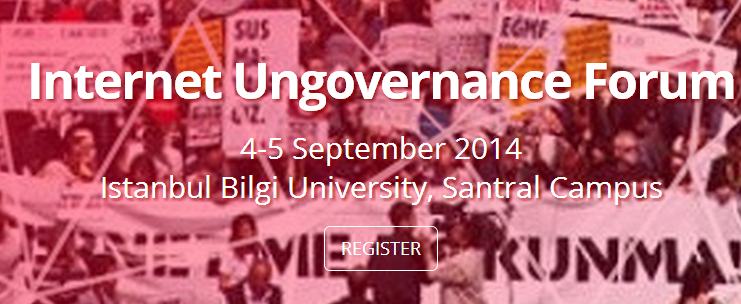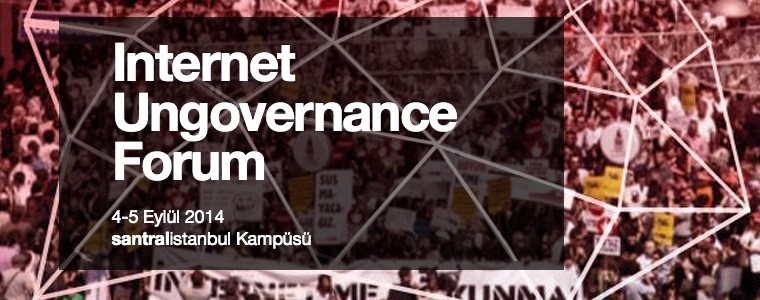
ISTANBUL – Activists have long repeated the maxim that being against something isn’t enough: One has to build alternatives.
So when the United Nation’s Ninth Annual Internet Governance Forum (IGF) came to town and proceeded to exclude many critical voices from Turkey’s online activist community, they simply threw their own party.
Scores traveled across town to the activist-organized Internet Ungovernance Forum at Bilgi University, a two-day conference that brought together hackers, activists, academics and diplomats from around the globe.
While the mainstream IGF conference has framed the global surveillance crisis, which hit headlines after the revelations of former NSA contractor-turned-whistleblower Edward Snowden, as a harm to e-commerce or a problem of government overreach – conveniently leaving out the unholy alliance between tech companies and intelligence agencies – hacker activists didn’t mince words at the Ungovernance Forum.
Aral Balkan, a designer working to develop a smartphone that doesn’t leech private data to third parties, argued that the nominally free services offered on the web aren’t actually free at all, since they require users to surrender personal and sensitive information about their daily life and habits.
“With their business model of spyware -– and we need to start calling it that – we need to start understanding that the business of Google and Facebook and these Silicon Valley companies are threatening our civil liberties,” Balkan said.
As word spread around the halls of the UN forum, which many participants complained was heavy on workshops but light on content, many crossed the city to see what the Ungovernance Forum was all about.
That included one of the chief organizers of the UN forum, Janis Karklins, a former Latvian diplomat. He denied that voices critical of the host country, Turkey – whose government earlier this year banned YouTube and Twitter until a high court ruling overruled the executive – but admitted there is room for improvement in the UN process.
“In IGF there are no taboos of speech, provided that this speech or conversation is done in a respectful manner,” he said.
Karklins later told Occupy.com that the alternative forum had merit, despite competing with his own conference. “I think that this is good that civil society [has] come together and is really concerned about the development of Internet in the country,” he said. “Personally, I regret that this is done at the (same) time of IGF and not a day later, because I think the presence of those people who participate here would be very useful in IGF.”
Anti-censorship activists in Turkey had complained that all four of their submissions for workshops were rejected without any explanation. Law professor Yaman Akdeniz, a longtime censorship critic, said a country with such a poor digital censorship and surveillance record had no business hosting a forum on Internet governance.
He said his country is entering a crisis of democracy as President Recep Tayyip Erdoğan’s Islamist-rooted Justice and Development Party consolidates its grip on power and moves the nation toward single-party rule.
“The democratization process has slowed down and they are more keen to introduce further surveillance measures and infrastructure,” Akdeniz told Occupy.com. “They’re building an Orwellian state.”
Keynote speaker Jacob Appelbaum, a U.S. hacker, activist and close associate of WikiLeaks, delivered a warning that rising surveillance has dangerous implications, as real-time tracking is already being used for targeted harassment, kidnappings and assassinations by national intelligence agencies from purportedly democratic countries like the United States.
He said the infrastructure built by the National Security Agency to implement mass surveillance on a global scale is a major part of the problem.
“When you create oppressive structures, they are used for oppression – that is what happens,” Appelbaum said. “For resistance we need a diversity of tactics and a diversity of strategies, but we need a unity of goals. But for me, the goals are simple: There are fundamental human rights and democracy for all people on the planet without exception.”
Encryption technology was offered as one solution to the growing surveillance problem. Privacy expert Chris Soghoian of the American Civil Liberties Union said that the same technology that makes it difficult for governments to snoop also makes online transactions more secure.
“It’s very easy for our citizens and public interest groups to call for more encryption, more digital security technologies, without even raising the topic of surveillance,” Soghoian said. “Instead of debating this as a surveillance issue, as a public safety issue, we’re just talking about this as a cybersecurity issue.”
Edward Snowden had been hyped to deliver a live speech to the activist forum from Moscow, where he lives in exile, but canceled at the last minute, blaming unspecified “technical problems” that made his communication impossible.
Instead, he delivered a written statement in which he said that in an ideal world, national governments would respect their citizenry enough not to filter digital communication.
“Sadly, we do not yet live in that world,” Snowden wrote Friday. “Perhaps in time, governments will realize that the serious cybersecurity and foreign-surveillance threats posed by censorship equipment outweigh whatever supposed benefits of national stability and control that they bring.”
This year’s Ungovernance Forum successfully muscled its way into the conversation on the future of the Internet – asserting not only that the Internet isn't governable, but that an active digital citizenry won't follow scripted "governance forums" and will insist, instead, on a global dialogue about what they want their Internet to be.
3 WAYS TO SHOW YOUR SUPPORT
- Log in to post comments

















